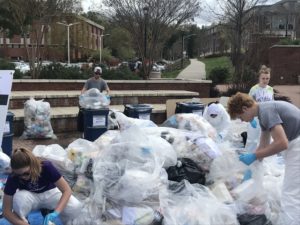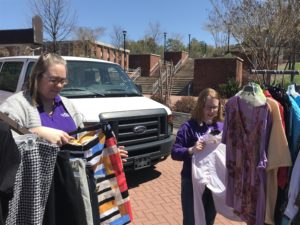Co-written with Jeremy Giovanni
Western Carolina University strives to be a school that gives back to the community. Many students on campus participate in various clubs and organizations that go above and beyond to help those throughout the region.

WCU students picking through trash to be recycled for Eco Cats Photo by: Austin Page
Among the biggest and most popular of these events is the Tuck River Clean Up, voter registration and student participation, 9/11 day of service, MLK day of service, and helping clean up the Community Garden.
Curricular space also plays a role in the center with over 100 service learning courses across campus that take learning and service in and out of the classroom.
In most of these projects, the Western Carolina Center for Service Learning is either the initiator or supporter. The Center is dedicated to helping strengthen the relationship between students on campus and the wider community.
For a related story on service learning, click here.
During Student Appreciation Week, the center sets up a table in central plaza selling clothes at cheap prices. The clothes were donated by students and Sylva Linings, a non-profit thrift store in downtown Sylva where they help support the people in need in the community. The money raised during the sale is going back to Sylva Linings.
“Over the past couple days we have raised over $500 and they don’t do that in a week. This just shows how powerful the students of campus can be if we bring this to them,” said volunteer Jessica Olshefski.

Customers looking at clothing provided by service learning booth. Photo by: Austin Page
On April 25, the Eco C.A.T.S, in collaboration with the sustainability initiative began work on “Mount Trash-more” collecting the trash from across campus and placing them in the proper recycling bins. Nearly a half a ton of trash was collected in the central plaza, the trash that is non-recyclable will be taken to the landfill. There is a cover for what is taken to the landfill at about $64 per ton of garbage, so with every ton of recycled material that can be taken out can not only save the amount of trash in landfills but money as well.
“I have a passion about helping people become more sustainable so that we can have a better world for our kids,” said student volunteer, Joshua Turnvall. “I am an environmental science major, so my focus is to make more sustainable engineering and things that work with the environment anyway so why not come out here and help out.”
WCU is one of 360 universities in the United States that have the Carnegie Community Engagement Classification , a framework for describing institutional diversity in higher education to collaborate on curricular and community partnerships.
“I think universitites are very good at abstract knowledge,” said the director of the Center for Service Learning, Dr. Lane Perry. “As a sort of counterbalance to that as we become informed on things you read, digest, and download. You also become informed by doing and applying and getting out. Otherwise, you are becoming the armchair activist.”
Perry went on by saying, “What service learning does is it sort of inquiries in a lot of ways for students to get outside of the chair. Students have described it to me as it is no longer only in my book but in my face.”
Based on the students on campus they don’t want to be just “armchair activists.” Michael Sargent, a junior at WCU, says he does community service quite often mainly as a staff member for the Tuck River Clean Up. On the subject of if he feels WCU handles community service well he said, “I feel like there could be more financial support from Western itself.”
WCU sophomore Mallaidh Mleziva had a different view.
“I do think WCU handles community service well. They make it extremely easy to get involved through designated workdays and volunteer weeks,” Mleziva said.
It seems that the biggest problem for students to get involved is that they want to stay focused on their studies and other activities. Students like sophomore Cameron Morris have little time left between classes and the band practices.
Service learning strives itself with the idea of having the responsibility of giving not only students the knowledge to give back to their campus, but to provide the support to any individual that they can so that they can take that feeling back home, or wherever they end up, and know that they can take action to make a difference.
Kevin McNamara contributed to the story.


